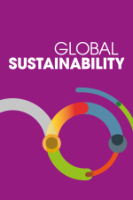The Politics and Governance of Negative Emissions Technologies
Recent projections to stay within 2°C and especially 1.5°C rely upon both more aggressive emissions cuts and larger scales of “negative emission technologies” (NETs). Yet not only are NETs’ actual development and scalability still uncertain, the technologies would present social and environmental risks of their own. Despite the growing realization of NETs’ necessity, their international politics and policies remain amorphous and emerging. The relevant issues are complex. NETs will function across a wide range of temporal and spatial scales, affect many interrelated natural and social systems, and involve multiple sectors of society, government, and the economy. Understanding their politics and governance requires not only a diversity of perspectives, but their integration into interdisciplinary conversations and research. I organized a workshop that brought together 25 international experts to discuss the politics and governance of NETs. Its objective was to bring together diverse scholars in the social sciences to deepen the understandings of the challenges and opportunities of NETs’ research, development, and possible implementation. This editorial introduces the resulting special collection of articles in Global Sustainability.

